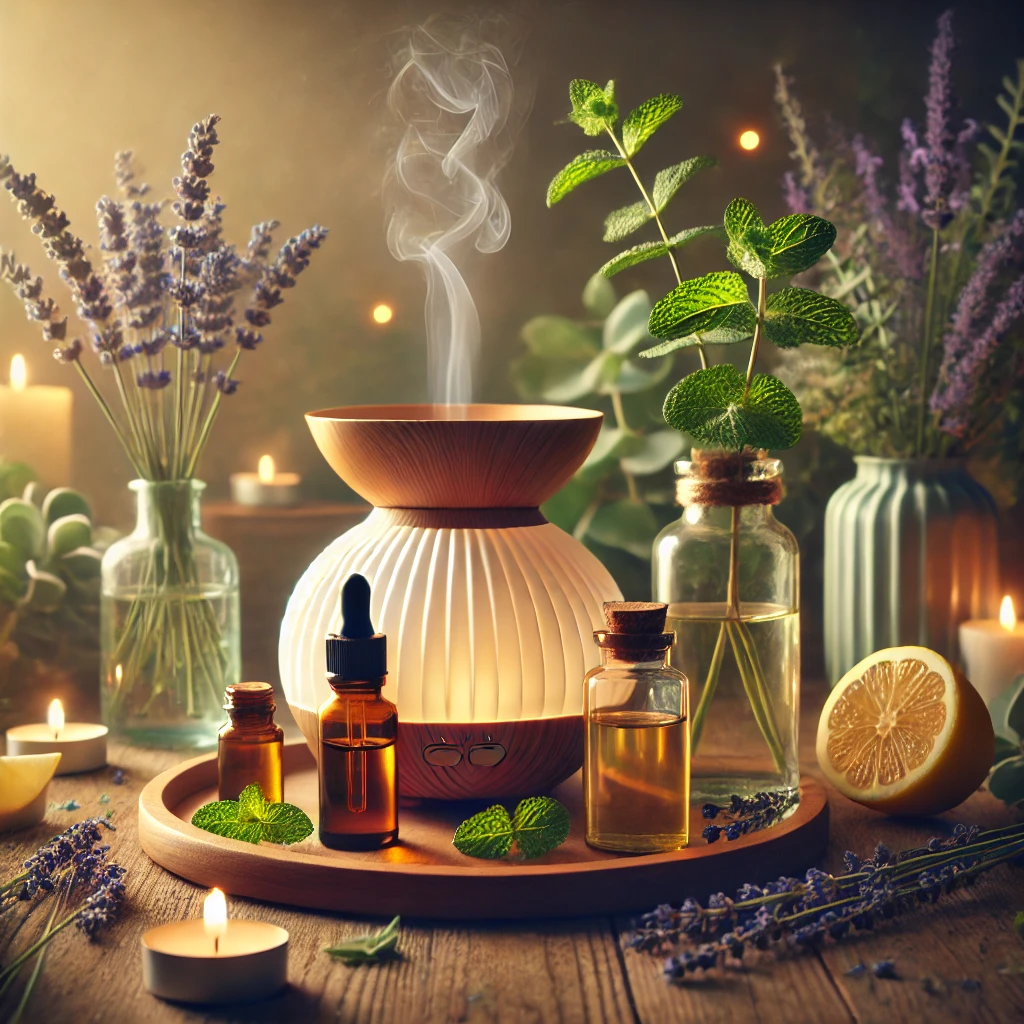Aromatherapy: Healing with Essential Oils & Scents
Aromatherapy is a holistic healing practice that utilizes essential oils and plant extracts to promote physical, emotional, and spiritual well-being. Rooted in ancient traditions and widely used in modern alternative medicine, aromatherapy harnesses the therapeutic properties of aromatic compounds found in flowers, herbs, and resins.
It is commonly used for stress relief, relaxation, immune support, and energy balancing, making it a key component in holistic wellness, meditation, and natural healing practices.
1. History and Origins of Aromatherapy
1.1 Ancient Uses of Aromatherapy
- Egypt (3,000 BCE): Egyptians used aromatic resins and essential oils in spiritual rituals, embalming, and medicine.
- China & India (Ayurveda): Essential oils and herbs were used in traditional Chinese medicine and Ayurvedic healing.
- Greece & Rome: Hippocrates, the “Father of Medicine,” promoted the use of fragrant oils for health and relaxation.
- Medieval & Renaissance Europe: Herbal distillation became popular, and essential oils were used for protection against disease (e.g., during the Black Plague).
1.2 Modern Aromatherapy
- The term “Aromatherapy” was coined in the 1930s by French chemist René-Maurice Gattefossé, who studied the healing properties of lavender oil.
- Today, aromatherapy is used in spa treatments, holistic medicine, energy healing, and emotional therapy.
2. How Aromatherapy Works
2.1 Mechanisms of Action
Aromatherapy works through two main pathways:
- Inhalation (Olfactory System & Brain Stimulation)
- Essential oil molecules enter the nose, stimulating the olfactory system and sending signals to the limbic system (the brain’s emotional center).
- This influences mood, memory, and physiological responses such as relaxation, alertness, or emotional balance.
- Topical Application (Absorption Through the Skin)
- Essential oils can be diluted and applied to the skin for therapeutic benefits.
- They penetrate the skin and enter the bloodstream, affecting muscles, circulation, and inflammation.
2.2 Common Aromatherapy Methods
| Method | How It Works | Common Uses |
|---|---|---|
| Diffusion | Disperses essential oils into the air | Relaxation, meditation, air purification |
| Inhalation | Deep breathing of essential oil vapors | Emotional balance, stress relief, respiratory support |
| Massage | Blended oils applied to skin with massage | Pain relief, muscle relaxation, circulation |
| Bath Therapy | Essential oils added to warm water | Detoxification, relaxation, skin care |
| Compresses | Oils applied to warm/cold cloth on skin | Pain relief, swelling, healing wounds |
3. Essential Oils and Their Benefits
3.1 Most Popular Essential Oils & Their Uses
| Essential Oil | Key Benefits |
|---|---|
| Lavender | Calming, sleep aid, reduces anxiety & stress |
| Peppermint | Energizing, relieves headaches, improves focus |
| Eucalyptus | Clears sinuses, boosts immunity, relieves congestion |
| Tea Tree | Antibacterial, antifungal, skin healing |
| Lemon | Uplifting, detoxifying, mental clarity |
| Frankincense | Spiritual grounding, deepens meditation, reduces inflammation |
| Rose | Heart-opening, emotional healing, skin rejuvenation |
| Chamomile | Calming, soothes insomnia, anti-inflammatory |
3.2 Essential Oils for Specific Needs
- Stress & Anxiety: Lavender, Chamomile, Bergamot, Ylang Ylang
- Energy & Focus: Peppermint, Lemon, Rosemary, Eucalyptus
- Sleep & Relaxation: Lavender, Sandalwood, Cedarwood, Vetiver
- Spiritual & Meditation: Frankincense, Myrrh, Palo Santo, Sage
- Pain Relief & Inflammation: Eucalyptus, Ginger, Wintergreen, Clove
4. Safety and Precautions in Aromatherapy
4.1 Dilution & Safe Application
- Essential oils should never be applied directly to the skin without dilution.
- Dilute in carrier oils (e.g., coconut, jojoba, almond oil) before topical use.
- Typical dilution ratios:
- 1% dilution (for sensitive skin): 1 drop essential oil per teaspoon carrier oil.
- 3-5% dilution (for therapeutic use): 3-5 drops per teaspoon carrier oil.
4.2 Potential Risks & Contraindications
- Some oils cause skin irritation or allergic reactions (e.g., Cinnamon, Clove).
- Avoid certain essential oils during pregnancy (e.g., Rosemary, Clary Sage).
- Essential oils can be toxic to pets (e.g., Tea Tree, Eucalyptus).
- Photosensitive oils (e.g., Citrus oils) can cause burns if exposed to sunlight.
4.3 Essential Oil Storage & Quality
- Store oils in dark glass bottles away from heat and light.
- Look for 100% pure, therapeutic-grade essential oils without additives.
5. Aromatherapy and Energy Healing
5.1 Aromatherapy in Chakra Healing
Each essential oil corresponds to different chakras, helping to balance and cleanse energy centers.
| Chakra | Essential Oils | Effects |
|---|---|---|
| Root (Muladhara) | Cedarwood, Patchouli, Vetiver | Grounding, stability, protection |
| Sacral (Swadhisthana) | Ylang Ylang, Orange, Sandalwood | Creativity, sensuality, emotional flow |
| Solar Plexus (Manipura) | Lemon, Ginger, Peppermint | Confidence, motivation, energy |
| Heart (Anahata) | Rose, Jasmine, Bergamot | Love, compassion, emotional healing |
| Throat (Vishuddha) | Chamomile, Eucalyptus, Spearmint | Communication, clarity, truth |
| Third Eye (Ajna) | Frankincense, Clary Sage, Lavender | Intuition, spiritual insight, awareness |
| Crown (Sahasrara) | Myrrh, Palo Santo, Lotus | Divine connection, enlightenment, meditation |
5.2 Aromatherapy in Reiki and Meditation
- Essential oils enhance Reiki, crystal healing, and energy work.
- Diffusing Frankincense, Sandalwood, or Myrrh deepens meditation and spiritual awareness.
- Using oils during breathwork can amplify healing energy and relaxation.
6. Frequently Asked Questions (FAQs)
6.1 Is Aromatherapy Safe for Everyone?
- Generally safe, but some oils require caution for children, pets, and pregnant women.
- Always test for skin sensitivity before applying topically.
6.2 How Long Does Aromatherapy Take to Work?
- Effects can be immediate (inhalation) or take time (topical use) depending on the oil and method used.
6.3 Can Aromatherapy Replace Medicine?
- Aromatherapy is a complementary therapy, not a substitute for medical treatment.
- It enhances holistic healing but should be used alongside proper healthcare.
6.4 How Can I Use Essential Oils for Better Sleep?
- Diffuse Lavender, Chamomile, or Vetiver before bed.
- Add a few drops to a warm bath or pillow spray.
6.5 What’s the Best Way to Start with Aromatherapy?
- Begin with a basic set of essential oils (Lavender, Peppermint, Lemon, Tea Tree).
- Try diffusing, applying diluted blends, or adding to bathwater.
Conclusion
Aromatherapy is a powerful natural therapy that combines plant-based healing, energy work, and holistic wellness. Whether used for stress relief, meditation, or health support, essential oils offer a safe and effective way to enhance well-being.

